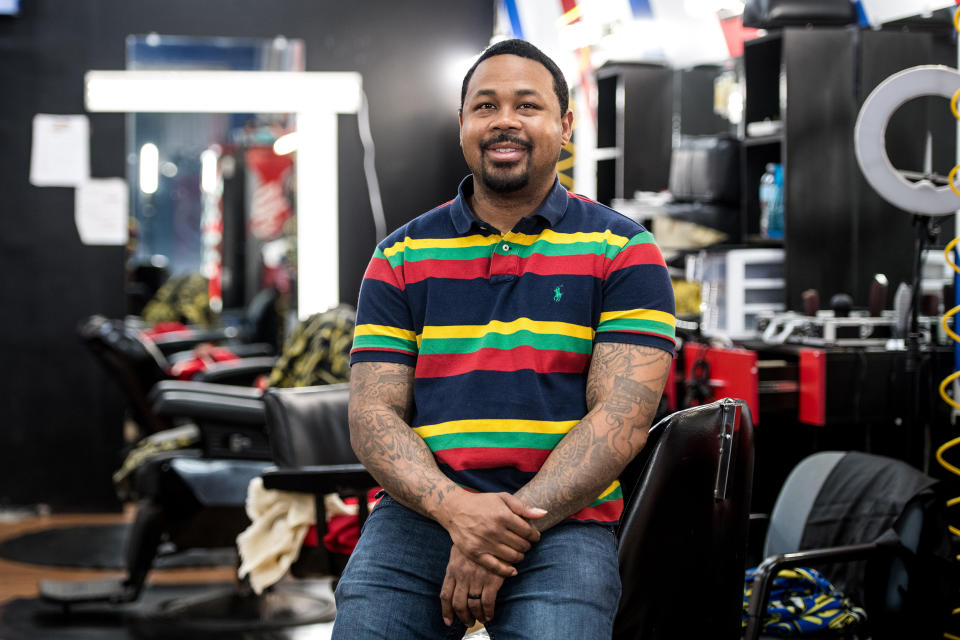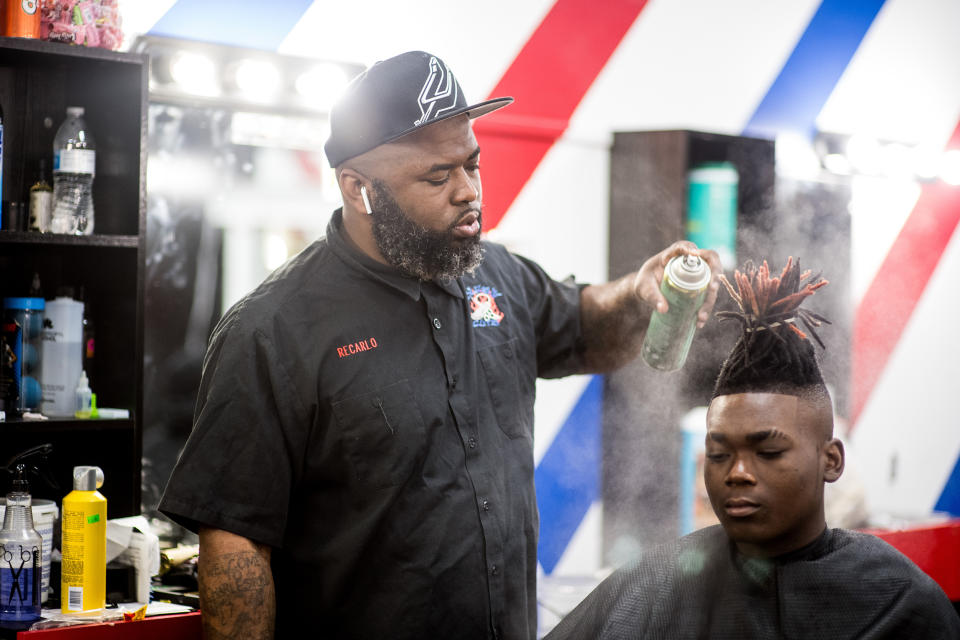'The black man's country club': To understand black voters, look to their barbershops
CHARLESTON, S.C. — Lucciono's barbershop owner ReCarlo Lewis is arguing with one of his barbers about the Democratic presidential candidates while the two men cut clients.
Lewis, 36, thinks the field is too weak and no one will beat President Donald Trump. The barber Eldred Anderson, 35, agrees but is leaning toward supporting billionaire businessman Tom Steyer in Saturday's First in the South primary.
"I kinda like some of the stuff he’s talking about," Anderson said. "But he won’t be as strong against Trump."
"To me, it’s not really a strong, strong, Democratic candidate — somebody that you feel can beat Trump," Lewis said. "You know how Trump operates, he uses guerrilla tactics. Trump has a personality that none of them have."
Anderson said he didn’t vote in 2016 because he didn’t like Trump or Democratic nominee Hillary Clinton and he may not vote this year either. He said if candidates spent more time in shops like this one, maybe he would vote.
"The barbershop plays a big role in the black community — from clothes, style, sports, politics. Maybe they should try to get more in tune with barbershops to understand what we care about," he said. "I want to hear less about who they are and more about the issues."

'Long, deep ties'
Black barbershops have long been key to the black community and a proxy for a voting booth, but it wasn't always this way. The practice first began as an outgrowth of slavery, said Quincy T. Mills, a professor of history at the University of Maryland and the author of "Cutting Along the Color Line: Black Barbers and Barber Shops in America," which traces the history of black barbershops from the pre-Civil War era to present day.
In the 19th century, freed black men owned the shops and white enslavers outsourced their slaves to be apprentices. During that time, white patrons would openly discuss slavery and politics — some even used black barbers as political surrogates for the black community.
It wasn’t until the 1930s that the salons became central spaces for the black community, mainly black men, who kept the political conversations going.
"Black people don't have full access to public spaces at this time and so barbershops were one of the few public spaces that they had not just access to but they could escape the surveillance of a larger white public," Mills said.
They became places where the community at large — mainly black men — and the barbers could talk about the most pressing issues of the day. It's a freer space than a church or a bar, Mills said.
"Barbershops have historically been places where men have talked about politics and the larger public sphere," he said. "There are only a few leaders in communities that can do that — it's barbers and beauticians and preachers, who have deep, long, deep ties to a particular local community."
"Folks go inside this space and talk about certain things that they may not talk about in a public park, for example," he said. "They trust the larger space so that they can debate and argue."

'The cornerstone of the community'
For the past year, the barbers at CJ’s Barbershop have been donating clean water to combat the water crisis in Denmark, S.C. — a rural town about 100 miles northwest.
It’s a majority-black town, population 3,500, where more than a third of the residents live below the federal poverty line and a campaign stop for presidential candidates to bring attention to environmental issues.
The shop has donated more than 500 cases of bottled water— and makes sure that whoever walks knows about the issue and how to help.
"We gotta do what we can, it's not just a lot of lip service — we have to do it," said Charles E. Maxwell, 44, the shop’s owner.
It’s emblematic of the role of the barbershop in the black community, he said. It’s not a church or a charity. It’s not a bar or a coffee shop. It’s not a book club or a community board. It’s a little bit of everything and they are often a barometer of voter sentiment.
"The role of the barbershop is to bring about education, enough information and awareness. I call it the black man’s country club, we just don’t have a fee but there's a lot you can learn from it," he said. "We are the cornerstone of the community."

'They take black folks for granted'
Bennie Gardner, 53, who owns a local convenience store, was waiting for his cut as he sat and watched the deluge of political ads on the television. First, there was Sen. Amy Klobuchar, D-Minn. "No," he said. Then there was former South Bend, Indiana mayor Pete Buttigieg (who has long struggled with black voters.) "No" — again — he said with a chuckle. There was also a "No" for Sen. Bernie Sanders, I-Vt.
For Gardner, it’s Biden all the way.
"I don’t think Trump can handle Biden — [Biden] would tear him up on a debate stage," he said.
Bu his barber Anderson J. Washington, 45, doesn’t think so.
"Bernie and Elizabeth can go toe-to-toe with Donald Trump on a debate stage," he said. But he plans to vote for Sanders. He likes Warren, too, but doesn’t think the country would elect a woman.

Gardner said South Carolina Rep. Jim Clyburn’s endorsement of Biden may have swayed other older black voters and that the Obama factor also played a role.
"Barack Obama picked him as vice president and he handled foreign affairs — he is more well-rounded and has more experience," he said.
Wendell Campbell, another patron, also cited Biden’s connection to the country's first black president.
"He’s still pushing for the stuff that Obama pushed for," Campbell said. "He was Obama’s vice president and that plays a big part for me."
Washington said politics is a "different environment because of Trump," so Democrats can’t do politics as usual by picking someone like Biden. "They take black folks for granted," he said. "You can't come down every election — Where were y'all before?"

Monica Maxwell, 41, a social worker and the owner’s wife, was the only woman in the shop at the time and really wants Warren to win but that "it’s going to take another white man to beat Trump — our country is still so misogynistic." Sanders is her second choice.
Biden, she said, is just "riding off of Obama’s grace."
Charles Maxwell said he is going for Biden because he thinks he’s the best candidate to beat Trump.
"Joe knows the office, he just has to put a muzzle on his mouth," he said, referring to Biden’s propensity for gaffes.
But if Sanders clinches the nomination, Maxwell said he too will cast a ballot in November for the Vermont senator.
"We can’t have a malignant narcissist, bigot and racist running this country anymore," he said.

